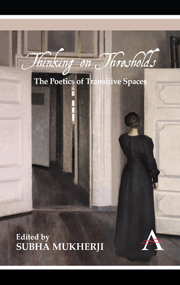Book contents
- Frontmatter
- ACKNOWLEDGEMENTS
- Contents
- List of Illustrations
- Notes on Contributors
- Introduction
- Part One Doors, Windows, Entries
- 1 Windows: Looking In, Looking Out, Breaking Through
- 2 ‘Zero…Zero…and Zero’: Permeable Walls and Off-stage Spaces
- 3 ‘The Queer Part Doors Play’ in Nabokov's Laughter in the Dark
- 4 ‘Invasion from Outer Space’: The Threshold of Annunciations
- Part Two Lives and Narratives, Territories and Worlds
- Part Three Matter, Mind, Psyche
- Part Four Reading, Writing, Playing, Listening
- Select Bibliography (including Discography)
3 - ‘The Queer Part Doors Play’ in Nabokov's Laughter in the Dark
from Part One - Doors, Windows, Entries
Published online by Cambridge University Press: 05 March 2012
- Frontmatter
- ACKNOWLEDGEMENTS
- Contents
- List of Illustrations
- Notes on Contributors
- Introduction
- Part One Doors, Windows, Entries
- 1 Windows: Looking In, Looking Out, Breaking Through
- 2 ‘Zero…Zero…and Zero’: Permeable Walls and Off-stage Spaces
- 3 ‘The Queer Part Doors Play’ in Nabokov's Laughter in the Dark
- 4 ‘Invasion from Outer Space’: The Threshold of Annunciations
- Part Two Lives and Narratives, Territories and Worlds
- Part Three Matter, Mind, Psyche
- Part Four Reading, Writing, Playing, Listening
- Select Bibliography (including Discography)
Summary
Two thirds of the way through Laughter in the Dark, when the protagonist Albinus becomes convinced that his mistress Margot is drowning behind the bathroom door, Nabokov parenthetically confides that Albinus is ‘quite unconscious of the queer part doors played in his and her life.’ In this instance, the closed door, along with the sound of rushing water, conceal Margot's infidelity; she and her lover Axel Rex canoodle in the room adjoining the bathroom, on the other side to that in which Albinus panics. Albinus is thus ‘unconscious’ of the bathroom door's implication in the sense that he mis-suspects it of harbouring tragedy. Although unconscious of its actual implication, he suspects it of meaning something.
One way of reading Albinus's misconstruction is as a kind of displaced critical acuity. No, the bathroom door does not signify death, but doors do consistently anticipate change in the novel. ‘[N]o sooner had she crossed the threshold than she yielded with pleasure and zest to [her] fate’, writes Nabokov of Margot's double seduction by her first lover's flat and the lifestyle it seems to foreshadow. More bleakly, Albinus opens the door of his family home to find that his wife has discovered his affair and left him; he opens the ‘creaky’ (from ‘croak’) nursery door to find his daughter's dead body; and ultimately, he expects to ‘unlock the door of his blindness’ by killing his faithless mistress. Albinus is conscious of the meaning of doors as harbingers of loss. However, his premonition is more important than the specific form it takes.
- Type
- Chapter
- Information
- Thinking on ThresholdsThe Poetics of Transitive Spaces, pp. 29 - 42Publisher: Anthem PressPrint publication year: 2011



